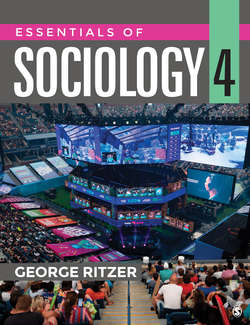Читать книгу Essentials of Sociology - George Ritzer - Страница 40
На сайте Литреса книга снята с продажи.
Do Sociological Theory and Research Help Us Understand Today’s Overheated Politics?
ОглавлениеSince the 2016 election of Donald Trump, American politics has been far more fraught than usual with political maneuvering, fiery rhetoric, and intense partisanship. Trump has been reported to revel in the chaos that was characteristic of both his campaign and presidency. More importantly, as President Trump has aggressively sought to implement his largely conservative agenda, liberals have ramped up their rhetoric and political opposition to it.
How would a sociologist deal with such highly partisan political action and mutual antagonism? The answer depends to a large extent on which sociologist you ask. Like other scientists, sociologists use theories and do research to make sense of the phenomena they study. A sociologist’s perspective on any given issue is therefore framed by the particular explanatory theories and research methods to which he or she subscribes.
Theoretically, some sociologists suggest that partisan political maneuvering and debate, even if impassioned, are a normal aspect of stable government, necessary to resolve issues and move society forward. Others believe that factions fighting to promote their own interests are enacting a simple, if large-scale, power struggle. Still others might focus on the interaction of those involved in the conflict.
In this chapter, we first identify the particular sociological theories that frame each of these perspectives—and many more. Each is the product of decades (and sometimes centuries) of development, and each has undergone testing, modification, and critique by some of sociology’s greatest minds. As you learn about the notable sociological thinkers—both classical and contemporary—and the theories they developed, consider the sociopolitical events that shaped them during their lives. Consider too the events that have shaped, and are shaping, you and your own perspectives on the world. Finally, use those perspectives (yours and those of sociologists) to think about U.S. politics today.
Second, we will look at the major research methods in sociology. Some of them are qualitative, involving observation and interviews. Using those methods, a sociologist interested in the political issues mentioned above could, for example, observe an acrimonious debate in the U.S. Senate or interview senators on both sides of that debate. Quantitative methods include surveys of those involved and experiments involving small groups on either side of a major political issue. Instead of doing their own survey on this issue, sociological researchers could reanalyze relevant data collected by the government or other researchers. Another method involves a historical-comparative analysis to see whether political debates in the United States were more or less heated at other times and/or in other parts of the world. Finally, a researcher could analyze the content of the Congressional Record, the official record of daily debates and proceedings in the Congress, to study differences in political debates over time.
The current high level of political tension in the United States gives the theorist and the researcher much to think about and to study.
